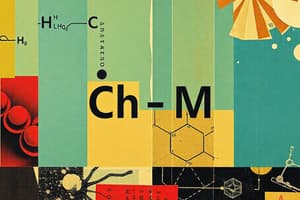Podcast
Questions and Answers
What is the focus of the text?
What is the focus of the text?
- The properties of specific chemical elements (correct)
- The role of enzymes in biological reactions
- The history of chemical reactions
- The benefits of organic compounds in daily life
Which element is discussed in relation to oxidation numbers?
Which element is discussed in relation to oxidation numbers?
- Silver
- Calcium
- Sulfur
- Chromium (correct)
What do compounds like sodium dichromate play a role in?
What do compounds like sodium dichromate play a role in?
- Polymerization reactions
- Combustion reactions (correct)
- Photosynthesis
- Neutralization reactions
Why is balancing chemical equations important?
Why is balancing chemical equations important?
What role do certain chemicals play in reactions?
What role do certain chemicals play in reactions?
How are compounds classified based on stability and reactivity?
How are compounds classified based on stability and reactivity?
What type of elements belong to the transition metals series?
What type of elements belong to the transition metals series?
Which types of orbitals receive electrons to form the transition metals?
Which types of orbitals receive electrons to form the transition metals?
What is the general electronic configuration of the outer orbitals of transition elements?
What is the general electronic configuration of the outer orbitals of transition elements?
Which element has an electronic configuration of 4d10 5s0?
Which element has an electronic configuration of 4d10 5s0?
In the periodic table, where is the d-block located?
In the periodic table, where is the d-block located?
How many rows of transition metals are there in the periodic table?
How many rows of transition metals are there in the periodic table?
Which elements are included in the d-block of the periodic table?
Which elements are included in the d-block of the periodic table?
What type of orbitals are progressively filled in the f-block elements?
What type of orbitals are progressively filled in the f-block elements?
Which elements are proving to be excellent sources of nuclear energy in modern times?
Which elements are proving to be excellent sources of nuclear energy in modern times?
What group of elements does the d-block of the periodic table contain?
What group of elements does the d-block of the periodic table contain?
Where are the f-block elements located in the periodic table?
Where are the f-block elements located in the periodic table?
Which set of orbitals are filled in each of the four long periods in the d-block?
Which set of orbitals are filled in each of the four long periods in the d-block?
Which element plays a role in the oxidation of ethyne to ethanal in the Wacker process?
Which element plays a role in the oxidation of ethyne to ethanal in the Wacker process?
What is the group of elements that occupies the middle section of the periodic table?
What is the group of elements that occupies the middle section of the periodic table?
Which type of orbitals are progressively filled in the d-block elements?
Which type of orbitals are progressively filled in the d-block elements?
What is a common property exhibited by transition elements?
What is a common property exhibited by transition elements?
What is attributed to the high melting and boiling points of transition elements?
What is attributed to the high melting and boiling points of transition elements?
At what point do the maxima occur in terms of unpaired electrons per d orbital for strong interatomic interaction?
At what point do the maxima occur in terms of unpaired electrons per d orbital for strong interatomic interaction?
Flashcards are hidden until you start studying
Study Notes
- The text covers a range of chemical elements, compounds, and reactions.
- Discussions include topics like chromium, molybdenum, tungsten, and their properties.
- It delves into the concept of oxidation numbers for various elements like vanadium.
- Mentions compounds like sodium dichromate and their relevance in chemical reactions.
- Talks about the stability and reactivity of different compounds based on their oxidation states.
- Refers to specific chemical reactions involving various compounds and their products.
- Describes the role of certain chemicals as oxidizing or reducing agents in reactions.
- Highlights the importance of understanding the properties and behavior of different chemical elements.
- Mentions the significance of balancing chemical equations and identifying reaction products.
- Discusses the characteristics of specific compounds based on their chemical composition.
- Mentions the classification of compounds based on their stability and reactivity.
- Emphasizes the role of energy levels and bond energies in chemical reactions.
- Talks about the significance of various elements in the periodic table and their unique properties.
- Discusses the use of acids, bases, and other chemicals in chemical reactions.
- Mentions the importance of understanding the reactivity and behavior of different elements in reactions.
- Refers to specific chemical compounds and their applications in different contexts.
- Talks about the relationship between oxidation numbers and the behavior of elements in reactions.
- Mentions the role of energy levels and molecular structures in determining chemical behavior.
- Discusses specific chemical reactions involving different compounds and elements.
Studying That Suits You
Use AI to generate personalized quizzes and flashcards to suit your learning preferences.




